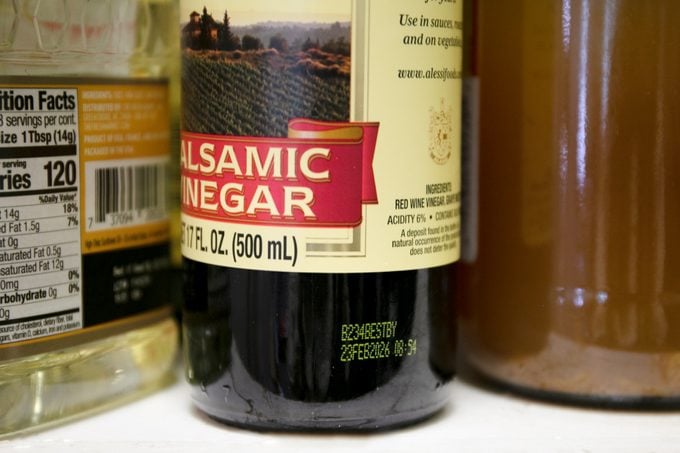Does Vinegar Go Bad?
Updated: Nov. 29, 2023

This pantry staple leaves many consumers scratching their heads because its shelf-life is so unusual. So, does vinegar ever go bad?
When it comes to vinegar, there are two camps of people: Those who can’t get enough and those who avoid its fermented funk. And speaking of funk, vinegar always has a funky smell, so how do you know when it’s past its prime? Does vinegar ever become too funky to consume safely? Does vinegar go bad? Does vinegar expire? Thankfully, the answer to these questions is about as clear as white vinegar.
Does Vinegar Go Bad?

If you look at a bottle of vinegar in your pantry, you’ll probably notice that it does, in fact, have an expiration date—but it’s not quite the same as the expiration date you’ll find on most other food products.
“Vinegar has an expiration date for quality purposes, but due to its high acidity—with a pH of 2-3—vinegar will never ‘go bad’,” says food safety and compliance certification expert Matt Regusci, of ASI Food Safety. Over time, the acidity level decreases, reducing potency.
That means that old vinegar is technically safe to consume because it won’t harm you in the same way old dairy or fish would, but that doesn’t mean its shelf life is “to infinity and beyond,” either. “Over time, due to improper storage and oxidation, vinegar quality and flavor may change,” says Regusci.
And vinegar shelf life is not a one-size-fits-all rule, either, as each type of vinegar has its own peak quality and freshness timeframe. “Wine, balsamic and rice vinegar has a shelf life of two to three years, and apple cider vinegar lasts five years,” says Regusci. “But distilled vinegar will be good forever.”
So rest assured, vinegar is not one of those pantry items you’re probably keeping for too long.
What if the Vinegar Is Cloudy?
Now that the question of “does vinegar expire?” is off the table, how do you assess freshness? Since the age-old “sniff test” is out due to its natural pungency, you may choose to rely on its visual appearance instead. If you’re noticing a general cloudiness in your vinegar, that’s your signal to buy a new bottle.
“When the vinegar starts getting cloudy, or the flavor is off, then oxidation has significantly changed the quality of the product,” explains Regusci. “But I wouldn’t say spoiled, I would say low-quality.”
If you find what looks like strings of sediment floating in your bottle, that’s called “mother”—it can form in any unpasteurized vinegar as a result of bacteria fermentation and is widely regarded as the most nutritious part—many health food advocates recommend choosing organic, raw, unfiltered apple cider vinegar with “mother,” for instance.
How to Store Vinegar
As Regusci alluded to earlier, improper storage is one of the quickest ways to degrade vinegar quality. To help give your vinegar purchase the longevity it deserves, he recommends storing it sealed in its original bottle in a cool, dark place. “Once you open the vinegar, it will still last a long time if you keep the lid on the original bottle and store it in a cool, dark place—like a pantry or cellar,” he says.
Even if your vinegar starts to lose its quality, know that there’s nothing inherently wrong with using it besides a slightly different taste and maybe some decolorization. If all else fails, use it to pickle vegetables or clean with it using these vinegar cleaning hacks.




















